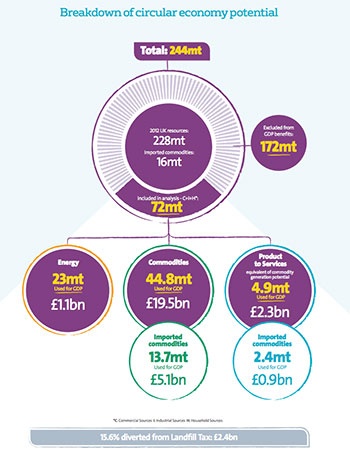Circular economy could add £29 billion to UK GDP
The circular economy is ‘the industrial revolution for a new generation’ with the potential to generate 175,000 new jobs and add £29 billion (1.8 per cent) to UK Gross Domestic Product (GDP), according to waste management firm Veolia.

The claims come from the ‘The Circular Revolution’ - a new report commissioned by Veolia and undertaken by Imperial College London university, to assess the potential economic benefits of the circular economy from a UK perspective.
According to the report, circular business models offer an opportunity for the economy to grow while ‘minimising the amount of virgin resources that are extracted’.
The report analyses the value generated from ‘commodities from households and commercial and industrial sources’, representing 30 per cent of resource flows in the UK, and explores six ways that the circular economy contributes to UK GDP.
Six ways to generate GDP value from the circular economy
- Landfill tax savings £2.3 billion – the researchers calculated the average landfill tax per tonne, multiplied it by total waste flow, and deducted current landfill tax receipts to reach the figure.
- Values of commodities and imports £23.7 billion – reused materials reduce the reliance on imports, and can be exported if surplus. The three largest material values are mixed metals (£10.7 billion), plastics (£2.3 billion) and wood (£2.1 billion).
- Energy values £1.1 billion – materials that cannot be reprocessed into commodities (23,774,273 tonnes) can used to generate electricity, subsequently sold at 10 pence per kilowatt-hour.
- Focused chemical initiatives £0.9 billion – used chemicals such as spent solvents, acid/alkaline wastes and used oils can be reprocessed to generate an estimated value of between £415 million and £888 million.
- Products to services including imports £3.1 billion – a defining feature of the circular economy is a move towards businesses offering a service rather than a product, which can be used to recover value from commodities.
- Existing contribution to waste management to the circular economy -£2.2 billion – the value of the UK Waste Management sector is up while the volume of waste is down suggesting an increase in Gross Value Added (GVA). Between 2004 and 2012, an additional £2.2 billion in value has been added.
175,000 jobs a ‘low estimate’
The report uses values from the 2010 Friends of the Earth report ‘More jobs less waste’ to estimate that 175,000 jobs will be created by implementing circular economy principles.
According to the company this ‘is based upon recycling of certain materials, does not cover all materials or aspects of the report (such as products to services), and is thus very likely to be an underestimate’.
Plastics, paper, steel and WEEE sectors are predicted to create the largest number of positions with: 89,372; 26,816; 21,673; and 21,200 respectively.
The report concludes: ‘When Veolia commissioned this report, we were convinced that there were gains to be made from UK businesses thinking circular. However, the findings have far exceeded our expectations of the contribution that the circular economy could make in terms of GDP and employment.
‘£29 billion and 175,000 jobs, with particular opportunities in the plastic sector, makes a compelling business case for change. Organisations that embrace the circular revolution now will make considerable savings in the future. Quick wins that require no additional funding, just a simple change in mindset’.
Findings ‘exceed expectations’
Speaking of the report’s findings, Estelle Brachlianoff Senior Executive Vice-President UK & Ireland said: “The world is facing an enormous challenge. Expanding populations and a rise in living standards means demand for raw materials is growing, at the same time resources are rapidly depleting. Businesses need to wake up to the unsustainable nature of our throw-away economy and put more value on resources.
“This report examines the economic benefit of this, highlighting how a transition to a circular economy has the potential to add 1.8 per cent to our GDP over a 10 year period. The findings of the report have exceeded our expectations – even if we only achieved a 50 per cent shift this would add £15 billion to the country’s economic output.”
The report’s leading author Dr. Nick Voulvoulis from the Centre for Environmental Policy at Imperial College London, added: “The report refers to the UK’s economy ability to become circular and to grow while resource use is declining. It goes beyond resource and energy efficiency; it also includes closing the loop between resource extraction, production, and disposal, moving towards the provisions of services, where materials are valued differently; creating a more robust economy in the process.”
Read The Circular Revolution. 









